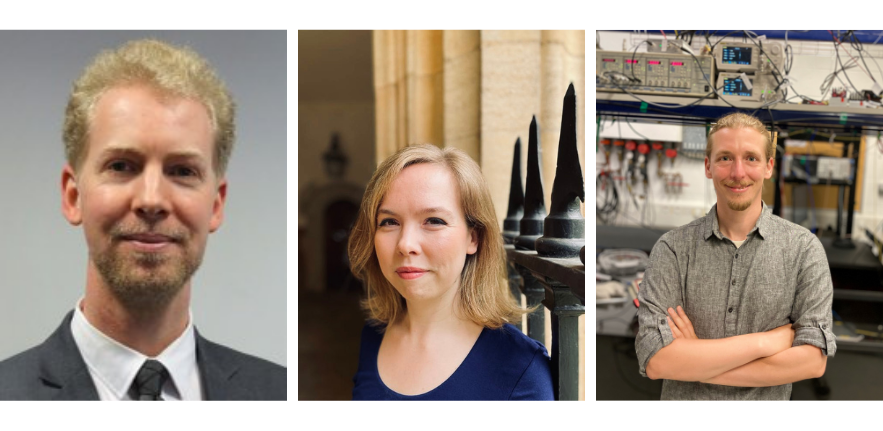
Submitted by Vanessa Bismuth on Thu, 05/08/2021 - 13:29
Three new University Research Fellows have been appointed by the Royal Society to take up their posts at the Cavendish Laboratory from the start of October. They are among the 37 successful University Research Fellowship (URF) candidates for 2021.
“We are honoured that Dr. Alice Thorneywork, Dr. Dorian Gangloff and Dr. Bart De Nijs will continue their early career research at the Cavendish Laboratory”, said Prof. Andy Parker, head of the Department of Physics at the University of Cambridge. “The Royal Society URF scheme is an exceptionally prestigious award that will support those talented scientists while they continue exploring exciting and innovative research spanning the physical sciences, from exciting soft matter systems and self-assembled plasmonic nanoarchitectures to quantum science and technology.”
Dr. Dorian Gangloff - Quantum Interface Engineering with Solid-State Spins and Photons
Dr. Gangloff is pushing the frontiers of quantum science and technology, focusing on proof-of-concept experiments with interacting spin quantum bits and photons in semiconductor materials.
He has a broad background in experimental quantum science, having completed his PhD in Physics at the Massachusetts Institute of Technology, where he developed control techniques for single-atom manipulation using light on a trapped-ion platform that is now a leading candidate for a quantum computer. He was most recently a Junior Research Fellow at St John's College (Cambridge), working at the Cavendish Laboratory as a postdoctoral associate, where he led milestone experimental efforts on all-optical control of electronic and nuclear spins in multiple solid-state platforms.
Dr Alice Thorneywork - The noise is the signal: ‘Exploring molecular noise and fluctuations with experimental soft matter models’
Dr Thorneywork’s research aims to understand fundamental aspects of transport processes and molecular fluctuations using novel model systems built from soft matter. To achieve this, she exploits a wide range of experimental techniques, from microfluidics and optical tweezing of colloids, to nanopores and DNA nanotechnology.
Alice began her research career at the University of Oxford, completing an MChem and then a DPhil in Physical Chemistry. The latter focused on the structure and dynamics of two-dimensional colloidal hard sphere systems and culminated in the first experimental elucidation of the two-dimensional melting of hard disks. For this work, she was awarded the biennial Young Scientist Award from the Statistical Mechanics and Thermodynamics Group of the Royal Society of Chemistry in 2019. Alice joined the Cavendish Laboratory in 2016 and currently holds an Oppenheimer Research Fellowship in the department and Postdoctoral By-Fellowship at Churchill College.
Dr Bart de Nijs - Extreme Plasmonics for Optically Controlled cHemistry (EPOCH)
Dr de Nijs has developed self-assembled plasmonic nanoarchitectures which allow him to focus light down to molecular length-scales and directly deliver optical energy where it is needed to induce desirable chemical reactions and photocatalytic processes. He will study how these self-assembled plasmonic nanoarchitectures can be used to visualise and track chemical reactions on a single molecule level in real-time, and how the highly localised fields generated in such assemblies can be used to make important chemical reactions more energy efficient.
He first obtained a BASc in Chemistry at the University of Applied Sciences in Utrecht and later a MSc in Chemistry & Physics at Utrecht University. He stayed on at Utrecht University to obtain his doctorate in Soft Condensed Matter Physics where he studied the self-assembly of nanoparticle systems. In 2013 he took up a position as a research associate at the Nanophotonics Centre in Cambridge and in 2018 was awarded an Isaac Newton Trust and Leverhulme Trust Early Career Fellowship.
Applications for the URF 2022 round opened on 13 July 2021. The URF scheme has expanded to include the biomedical sciences, and scientists from the biomedical sciences are encouraged to apply.
Dame Linda Partridge, Biological Secretary and Vice President of the Royal Society said, “The URF scheme honours high calibre early career scientists throughout the UK and Ireland. The COVID-19 pandemic has significantly impacted the research community, and so it is essential that long-term, flexible funding schemes like this are in place to continue to support the careers of researchers pursuing novel and ground-breaking research.
“The scheme is central to the Society’s commitment to fostering excellence in science by supporting early career researchers who are fundamental to the future of global science. It is gratifying to see the URF scheme expand this year to support the biomedical sciences, a discipline that was vital in the response to the pandemic. This will ensure we continue to support a wide breadth of science through the scheme.”
The complete list of 2021 appointments is available on the Royal Society website.
Image: from left to right, Dr Bart de Nijs, Dr Alice Thorneywork, Dr Dorian Gangloff.
